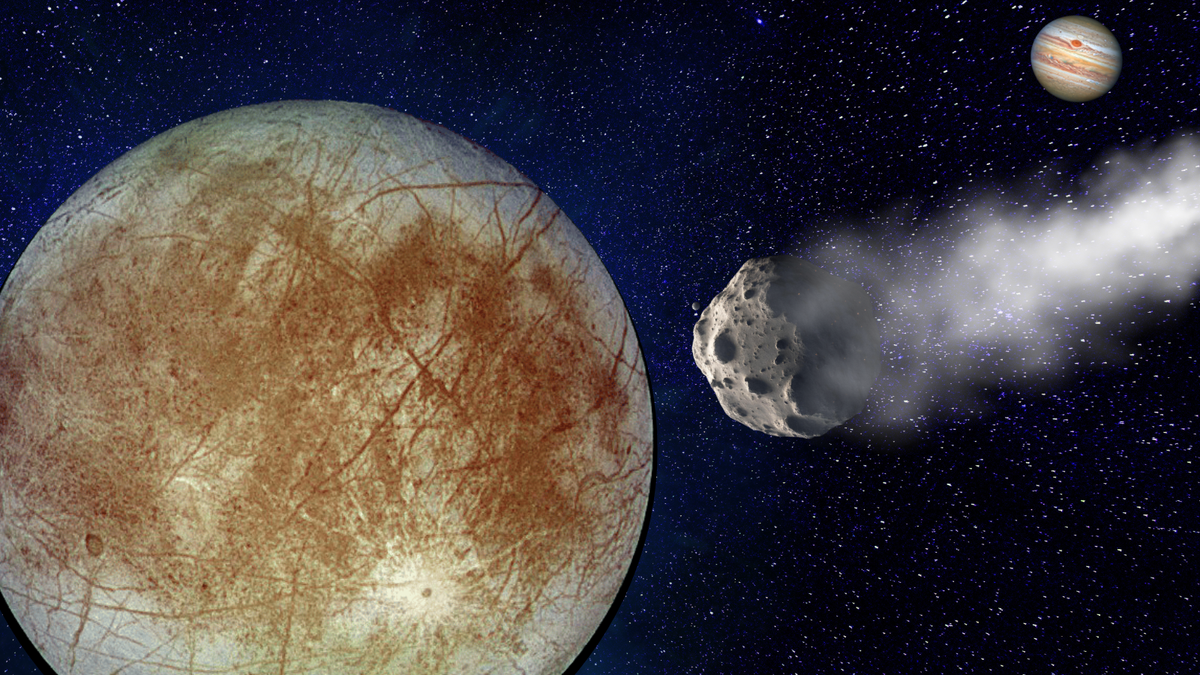Scientists hoping to find life in liquid water oceans beneath the frigid, icy shell of Jupiter’s moon Europa may get a helping hand from a “cosmic snowball fight” this world once engaged in.
Europa has long been considered a prime solar system location to search for evidence of simple life — life as we know it, at least). That’s because this 1,940-mile (3,100-kilometer) wide Jovian moon is believed to host saltwater oceans two to three times the volume of every sea on Earth put together. These oceans are believed to lurk beneath Europa’s icy crust, and such watery environments are key regions for the emergence of life. However, the likelihood of Europa hosting life, and the form that life may take on this world, is strongly dependent on the thickness of this moon’s ice shell. That thickness is something scientists have thus far struggled to determine.
But now, a team of planetary scientists may have some clues about the final value. After looking at large craters on Europa that resulted from asteroids and comets bombarding the moon, the researchers used these observations to determine that Enceladus’ shell is around 12 miles (20 kilometers) thick. And this shell, they say, likely floats on an ocean ranging in depth from 40 to 100 miles (60 to 150 kilometers) situated around the moon’s rocky core.
Related: Jupiter’s ocean moon Europa may have less oxygen than we thought
“Understanding the thickness of the ice is vital to theorizing about possible life on Europa,” Brandon Johnson, team co-leader and an associate professor at Purdue University College of Science, said in a statement. “How thick the ice shell is controls what kind of processes are happening within it, and that is really important for understanding the exchange of material between the surface and the ocean.
“That is what will help us understand how all kinds of processes happen on Europa,” Johnson continued, “and help us understand the possibility of life.”
Digging into an icy shell
Life as we know it requires three main components: Liquid water, certain chemical elements like carbon, hydrogen, nitrogen, oxygen, phosphorus and sulfur, and an energy source.
Scientists think life on Europa likely would be powered purely by chemical reactions, however, instead of the photosynthesis we see Earth-based plants and simple forms of Earth-based life partake in.
This is because Europa is constantly blasted by radiation from Jupiter, meaning life wouldn’t be able to exist at its surface. That means any life at Europa would have to dwell beneath the ice, where there is no sunlight. And sunlight is necessary for photosynthesis. Thus, for photosynthesis to work in this case, the ice layer would have to be thick enough to protect simple lifeforms like microbes from the radiation but still thin enough to allow this radiation to provide simple life with energy.

More specifically, the team estimated the thickness of Europa’s ice shell by examining observations made by the Galileo spacecraft in 1998. The scientists then modeled craters using a combination of physical characteristics and surface qualities that could have created the divets.
Johnson is well-versed in the study of colossal collisions planets may have experienced throughout the solar system’s 4.5 billion-year history, and how these impacts have shaped the worlds.
“Impact cratering is the most ubiquitous surface process shaping planetary bodies,” he said. “Craters are found on almost every solid body we’ve ever seen. They are a major driver of change in planetary bodies. When an impact crater forms, it is essentially probing the subsurface structure of a planetary body.
“By understanding the sizes and shapes of craters on Europa and reproducing their formation with numerical simulations,” he continued, “we’re able to infer information about how thick its ice shell is.”
This crater-study may tell the researchers a great deal about the icy shell of Europa, and even a little about the ocean beneath it as well as how material is exchanged between the two layers.
“Previous estimates showed a very thin ice layer over a thick ocean. But our research showed that there needs to be a thick layer — so thick that convection in the ice, which has previously been debated, is likely,” Shigeru Wakita, team co-leader and a researcher at Purdue University College of Science, said in the statement.
What this study reveals about the rocky heart of this Jovian moon is less clear, and the interaction between the rocky core and water may be essential to determine what minerals exist in the oceans of Europa. There thus remains a long way to go before scientists can confirm even the possible emergence of life on this moon of Jupiter.
The team’s research was published on Wednesday (March 20) in the journal Science Advances.

Dr. Thomas Hughes is a UK-based scientist and science communicator who makes complex topics accessible to readers. His articles explore breakthroughs in various scientific disciplines, from space exploration to cutting-edge research.








